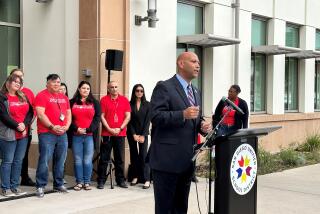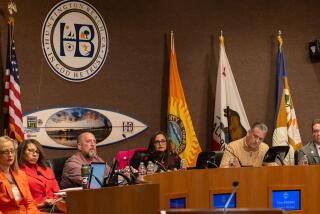Standing Up for Gays in Schools
In January, Arthur Smith ended years of hiding his homosexuality from fellow workers in the deaf and hard-of-hearing program at Madison High School.
Months of tension followed, and Smith, a veteran sign-language interpreter, felt worried enough about his job that he hired an attorney to protect his rights within the San Diego city schools bureaucracy.
So Smith has special reason to back a proposed policy, up for a final vote Tuesday before San Diego Unified School District trustees, that would prohibit discrimination against employees or students who are gay or lesbian.
The proposal would add language specifying sexual orientation to an existing school district non-discrimination policy. All five board members indicated last week that they back the change, but they are braced for opposition from religious and other groups.
Smith says he believes that with such a policy, he would have been treated more fairly after others at Madison learned he was gay.
But the new policy alone, although helpful, will not necessarily eliminate mistreatment or misunderstandings stemming from a person’s decision to be open about his or her sexuality, judging from Smith’s experience and the district’s response to his claims of unfairness.
The sexual orientation issue remains explosive within American society, even within a public school system where tolerance and diversity are often touted as major educational goals for both staff and students.
“I wanted to be out of the box I felt myself in,” Smith said in recounting his decision to be open, but not proselytizing, with his Madison colleagues.
“For too long, I would ‘desex’ my conversations, when someone asked what I did over the weekend or on a vacation. I just wouldn’t say who I did things with . . . I didn’t want to lie but I felt that (being gay) was a sickness--that was how I had been brought up.”
But Smith turned over a new leaf after the winter 1991 holidays. Last January, when asked in kaffeeklatsch conversation what he had done over Christmas, Smith told of the trip that he and his date--”and I said ‘he’ “--had taken.
“Their eyes got big--it wasn’t the normal thing to hear--and there was a great degree of silence,” Smith said.
He said that while he realized there would be some negative reaction, he was not prepared for the chain of events that followed.
“My supervisor called me in and said that some people were uncomfortable and that it probably wasn’t a good idea to come out at work,” Smith said. “And in retrospect, I think she thought she was doing me a favor as a friend.”
But after thinking about the warning for a day, Smith decided that “hey, I’m being honest and open as an individual and their being uncomfortable is their problem.”
However, no one approached him to say that they were uncomfortable, he said. In fact, one teacher who did approach him told him that she always figured he was gay and that it was “no big deal” to her. She simply had never asked him because Smith clearly had been uncomfortable with the subject.
Word spread around campus among both teachers and students, Smith said, and some students targeted him with name-calling while others were simply curious about his being gay.
About a month later, Smith said, he was summoned for the first of two contentious meetings with Madison Principal Errol Bennett.
“Bennett said he didn’t feel my conversations with students or staff were appropriate and that if he got any more complaints about me, I could be transferred or even terminated,” Smith said. “He said that wasn’t to say that he was threatening me, but of course he was.”
At that point, Smith decided to get an attorney.
Bennett last week declined comment on his dealings with Smith, saying that their meetings “come under the (heading of) counseling an employee about certain kinds of behavior on the job so I can’t really talk about it.”
But Bennett said that as far as he is concerned, Smith is “just an employee at Madison and to my knowledge, he has never been under a cloud or anything like that.” The principal also said the proposed policy “is a great idea . . . most of us realize that we deal in a different world than a number of years ago, and we have to be compatible with it and at ease with it.”
Smith’s case reached school Supt. Tom Payzant’s office when his lawyer, Paula Rosenstein, wrote a letter to Payzant complaining that the school was trying to censor Smith’s behavior.
“My feeling was, and is, that the work rules were not being applied the same for everybody,” said Rosenstein, who was given permission by Smith to talk about the case.
She said that someone sitting at a desk who hears a co-worker talking about his wife or girlfriend often “just tunes it out” but if the co-worker says something about he and his boyfriend doing something, “then the ears perk up and the person will take notice.
“Our point to the district was not that (Smith) was talking about his life too much but that people simply didn’t like what they heard, and therefore he was then being held to a different standard,” the attorney said.
In particular, Rosenstein said that Smith was criticized for responding to a female student monitor. Having heard that Smith was openly gay, the student monitor had showed him a magazine for teen-agers and asked him which pictures of boys in an article he thought were cute.
Rosenstein asserted that if a female teacher had been asked the same question and answered, or if a male teacher had been questioned about pictures of women by a student, there would have been no subsequent flap.
“It’s not whether the standard for everyone is too loose but whether Mr. Smith was treated differently because he is gay . . . the rules have to be interpreted the same for everybody,” Rosenstein said. “That’s the point.”
In addition, Rosenstein claimed that some Madison administrators tried to get teachers who work with Smith to volunteer to write derogatory things about him.
“They couldn’t find anyone because he does his job well and he knows how to comport himself appropriately,” Rosenstein said. “There were even teachers and principals who volunteered to be character references for him.”
Payzant expressed great reluctance to talk about Smith’s case specifically because of privacy regulations. But he agreed to talk about the general issues raised by Smith because of his own strong feelings that the new policy is necessary.
“The (Smith) case is the type of thing that the policy is designed to handle,” Payzant said, adding that he began thinking about the issue almost four years when the question came up on whether HIV-infected students or employees should be allowed to continue working.
The Smith case “does strengthen my sense” that the policy is needed, he said.
But Payzant said that all employees, whether gay or straight, “should know it is inappropriate for an adult to make any comments to students that could be perceived as having sexual overtones.
“It’s not an issue about being who you are but who you talk to, and in what setting,” Payzant said. “There are so many opportunities for misunderstanding and misrepresentation that discretion is the better part of valor when teachers talk to students about their personal lives.”
Payzant was quick to add: “I’m definitely not saying that this means anyone is trying to get students engaged in any kind of inappropriate behavior.
“Rather,” he said, “I’m saying that you have to know with students where not to cross the line in terms of being flip, or humorous, or even making a well-intentioned comment.”
He argued that societal standards for both gay and heterosexual employees have toughened even within the past year in terms of sexual harassment and appropriate behavior around students.
“It’s a very tough call” because students are often curious about the personal lives of teachers. “I just don’t think you go into detail with students about your personal life, your sexual orientation, your relationship with another adult, no matter” who you are, Payzant said.
Both Smith and Rosenstein credit Payzant with easing Smith’s situation.
“Mr. Smith was able to sit down and talk one-on-one with Dr. Payzant and I think that was good enough for him,” Rosenstein said.
Smith agreed, saying: “I’ve never met a more sympathetic person in my life, and he is the one who told me about the policy” to be voted on Tuesday.
“That policy would have made a tremendous difference for me because the prohibition against discrimination would have been right there in writing,” Smith said. “There are a lot of (gay and lesbian) employees who would like to be comfortable with their sexuality who’ve come up to me and said how brave I must have been . . . (and) that they are still afraid.
“That’s why this policy is so important.”
The initial shock of co-workers has worn off, Smith said, and “things are better . . . people are starting to be a lot more friendly. (Principal) Bennett just says ‘hi’ from time to time . . . I think he’s decided he should leave me alone and just treat me equally.”
Smith backs suggestions made last week by trustees Sue Braun and Susan Davis that the district, to the extent that some money is available, hold periodic seminars for their employees on sexual orientation.
The San Diego Community College District holds ongoing seminars on the topic for employees, and the district’s board of trustees changed its non-discrimination policy earlier this year to add sexual orientation language.
More to Read
Sign up for Essential California
The most important California stories and recommendations in your inbox every morning.
You may occasionally receive promotional content from the Los Angeles Times.










